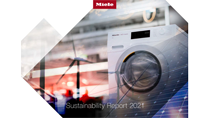Press releases
Miele barrier washing machines and increased safety for fire brigades

-
Reprocessing of full gear – from protective suits to helmets
-
Two-door barrier machines for segregation of processes at fire stations
Hazardous substances to which fire-fighters are exposed via their protective clothing can seriously affect health. These include smoke, diesel fumes and asbestos, which is provably carcinogenic, as well as toxic chemical residues. Help is now at hand in the form of barrier washing machines with two doors, allowing loading and uploading in separate rooms and preventing any redeposition of soil on textiles. Miele now offers three models in different sizes – particularly designed to rise to the challenges of fire brigades and rescue services.
Depending on the size of the drum, these machines with load capacities of 16 kg, 24 kg and 32 kg are able to reprocess three to six complete protective suits per cycle. Miele special-purpose programmes wash and then reproof, but, if required, washing and reproofing cycles can be run separately. Reproofing agent is then activated in a dryer. Additional programmes cater for breathing masks, chemical protection suits, rescue wear, helmets, fire-proof gloves and safety belts. Padded bags protect masks and helmets from damage.
Inside the machines, which have proven their worth over decades in nursing homes, two interlocking doors are the key to separating the dirty from the clean. Wash programmes are shown in a large display on the infeed side of the laundry or breathing apparatus workshop. Once a programme is complete, the drum hatch aligns with the outfeed side thanks to the autopositioning mechanism and is securely locked in place. Hence, there is no need to turn the drum by hand. On the outfeed side, the clean side of the operation, a display shows the machine's operating status. Here, protective clothing is unloaded before being transferred to the dryer or a drying cabinet. According to the relevant standard governing the planning of fire brigade premises, these too must be located on the clean side.
Like all Miele washing machines, barrier models also feature Miele’s patented honeycomb drum. Thanks to their structured surface design and their hexagonal pattern, this creates a film of water on which textiles gently glide. This, in turn, protects the delicate retroreflective strips on functional workwear.
These washing machines offer more than just hygienic and gentle fire brigade programmes. They also feature many ways of reducing consumption. The weight of the laundry load can, for example, be entered manually prior to starting a programme to optimise water, energy and detergent consumption.
Despite their different dimensions, all three barrier machines fit through standard doors thanks to their width of only 87 cm. These machines are designed for the use of a pallet truck and can easily be manoeuvred into a wall separating the infeed and outfeed sides. This saves time during installation and cuts costs.
Company profile: Miele is recognised as the world's leading supplier of Premium domestic appliances, with an inspiring portfolio for the kitchen, laundry and floor care in the increasingly networked home. The company also offers machines, systems and services for use in hotels, offices, care and medical technology. Since its foundation in 1899, Miele has lived up to its brand promise of "Immer Besser" in terms of quality, innovation, performance and timeless elegance. With its durable and energy-saving appliances, Miele helps its customers to make their everyday lives as sustainable as possible. The company is still owned by the two founding families Miele and Zinkann and has 15 production plants, eight of which are in Germany. Around 22,700 people work for Miele worldwide and the company's most recent turnover was around 5 billion Euro. The company has its headquarters in Gütersloh in Westphalia.
Anke Schläger
+ 49 5241 89-1949
anke.schlaeger@miele.com
Media information
| Description | Download |
|---|---|

Washing machines with two doors reprocess firefighting protective suits. The two separated sides prevent any redeposition of soil on cleaned textiles. (Photo: Miele) |
|
| High Resolution JPG |


